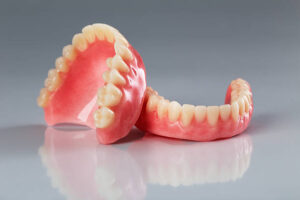 Dentures look and feel more realistic than ever before. They will fit comfortably and you may forget you’re wearing them. That is until dinner time. If food suddenly doesn’t taste as flavorful as before, your dentures may be the cause. Although most people don’t experience a decrease in taste sensations, certain situations can cause your dentures to interfere with the sense. Here’s how you can prevent your dentures from negatively affecting your sense of taste.
Dentures look and feel more realistic than ever before. They will fit comfortably and you may forget you’re wearing them. That is until dinner time. If food suddenly doesn’t taste as flavorful as before, your dentures may be the cause. Although most people don’t experience a decrease in taste sensations, certain situations can cause your dentures to interfere with the sense. Here’s how you can prevent your dentures from negatively affecting your sense of taste.
Taste Diminishes with Age
Did you know that your mouth has over 10,000 taste receptors? Not all are located on your tongue. You also have taste sensors on the roof of your mouth. Your nose works along with your mouth to send signals to your brain to differentiate between tastes.
As you age, your senses become weaker, including tasting and smelling. Researchers have found that flavor sensitivity is 49 times lower in the elderly than in the youth. Since many elderly people wear dentures, they attribute their loss of taste to their prosthetics, but this isn’t always the case. Diminished taste can be a result of the natural aging process.
Upper Dentures May Temporarily Affect Taste
If you’ve replaced your upper teeth, your denture may cover the roof of your mouth, which can affect your taste. It’s only a temporary issue for most patients. If you’re concerned about an upper denture affecting your sense of taste, there are palateless options, like an implant-supported solution.
Metallic Taste from Denture Adhesives
Denture creams used to hold dentures in place are known to alter certain tastes. It’s often reported to have a lingering metallic taste, which is often caused by overusing denture creams. Relining your dentures regularly will ensure a snug fit, so you don’t have to rely on an adhesive.
Poor Cleaning Routine
Dentures can’t get cavities, but that doesn’t mean you don’t need to brush your teeth. Food deposits and plaque can accumulate on your dentures. Not only will this damage them over time, but it can also cause your dentures to smell and taste bad.
You can prevent unwanted odors and avoid a bad taste in your mouth by brushing your dentures at least twice a day using a soft-bristled toothbrush and a mild hand soap or dishwashing liquid. Don’t forget to soak them in a denture solution overnight to kill bacteria your toothbrush couldn’t reach.
You don’t have to worry about your favorite foods losing their deliciousness. You can enjoy full flavor by keeping your dentures clean and fitting snugly. Although you can stop the effects of aging, your dentures don’t have to prevent you from savoring a variety of flavors.
About Dr. Joshua Kuykendall
Dr. Kuykendall achieved his dental degree from The University of Oklahoma College of Dentistry and has completed advanced training in various specialties, like dental implants, molar endodontics, dentures, and tooth extractions. He is a proud member of several professional organizations, including the American Dental Association and the American Academy of Implant Dentistry. Request an appointment through his website or call his office at (832) 957-7714.
